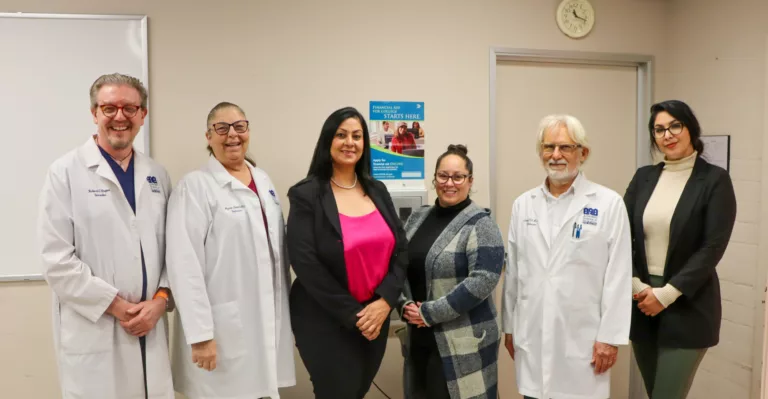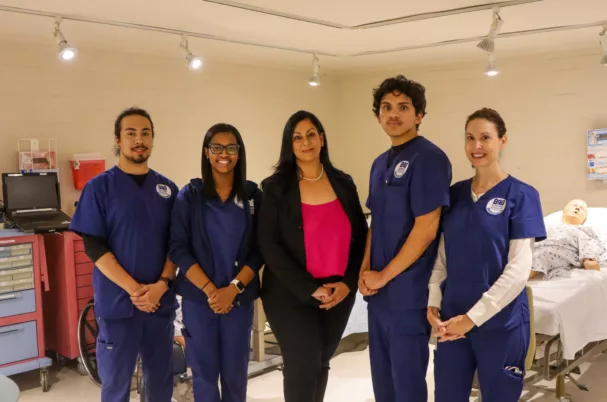At the Annenberg School of Nursing, on the campus of Los Angeles Jewish Health, Amandeep Kaur Found Her Calling


At the Annenberg School of Nursing, on the Campus of Los Angeles Jewish Health, Amandeep Kaur Found Her Calling
When she immigrated to the United States from her native India in 2004, 22-year-old Amandeep Kaur had completed her bachelor’s degree in mass communications and was working on a master’s. She landed in Los Angeles eager to advance herself, but quickly discovered the obstacles that lay ahead.
“I arrived here with $364 in my pocket and realized I would have to choose between going back to school and putting food on the table; I didn’t think I could do both,” she recalls.

Given her limited resources, Amandeep opted to join the workforce, securing a job at Subway as she explored opportunities to climb the ladder of professional success. Fortunately, she didn’t have to wait long: A regular Subway customer mentioned his mother lived at Los Angeles Jewish Health (then known as Los Angeles Jewish Home) and suggested Amandeep consider a nursing program there that would offer her employment while she studied in order to help cover the cost of the education. The next day, she took a bus to Los Angeles Jewish Health to look into this potential opportunity.
“It sounded too good to be true, but I discovered he was right,” Amandeep says. “I couldn’t believe it – I could simultaneously earn income and pursue my education as I built my own American dream! I signed up right away.”
Amandeep never looked back. She started classes at LA Jewish Health in April 2005; four weeks later, the organization officially hired her so she could get vital, hands-on experience as she made progress toward her nursing certificate. “I was incredibly grateful for the chance to develop new skills that could translate to a meaningful career,” she says.
Adjusting to life in a new country and culture was difficult, but Amandeep’s determination and drive pushed her through. “There were times when I felt defeated and wanted to go back to India. The challenge of making a living here felt too big, and I worried I couldn’t do it,” she says. “But this is a land of opportunity, and it pushes you. I believe we all have the capacity to succeed; it just depends on how we use it.”
Amandeep embraced the challenge, expertly juggling academics, work, and the responsibilities of starting a family. “Thanks to LA Jewish Health, I was able to work full-time while earning my nursing credentials,” she says – credentials that ultimately grew to include CNA (certified nursing assistant), LVN (licensed vocational nurse), RN (registered nurse), and PHN (public health nurse) certifications, as well as both Bachelor of Science in Nursing (BSN) and Master of Science in Nursing (MSN-Ed) degrees.
“During my LVN program, we were allowed to take three days off, plus the weekend; during that time, I flew to India, got married, and came back – all in just five days! To be honest, I’m not sure how I managed it,” she laughs.
In 2012, Amandeep left LA Jewish Health for a little while. She then returned in 2015 as an RN supervisor in the Joyce Eisenberg-Keefer (JEK) Medical Center. After three years, her professional excellence and her dedication to LA Jewish Health were recognized with her promotion to assistant director of Annenberg; just four months later, she was promoted again – this time, to director.
Today, Amandeep is thrilled to be at Annenberg’s helm, steering the school’s direction and being a part of the community she loves.
“LA Jewish Health is a family. When I walk into a building to make rounds, I run into so many friends – people who want to catch up or are looking for advice. I feel so at home here,” she says.
She also feels proud to be in a position to help nurture a new generation of nurses. “LA Jewish Health took a chance on me, and now it’s my turn to be able to invest in other people,” she says. “I wouldn’t be who I am today if it weren’t for LA Jewish Health. I’m so privileged to be able to pay that forward.”
The Annenberg School of Nursing has been ranked in the top three LVN schools in the entire state of California. Practicalnursing.org ranks nursing schools based upon their first- time successful pass rates for the state licensing exam, overall student support services and program elements more easily streamlining students towards achieving licensure. To learn more call 818-757-4431 or visit ASN.edu
